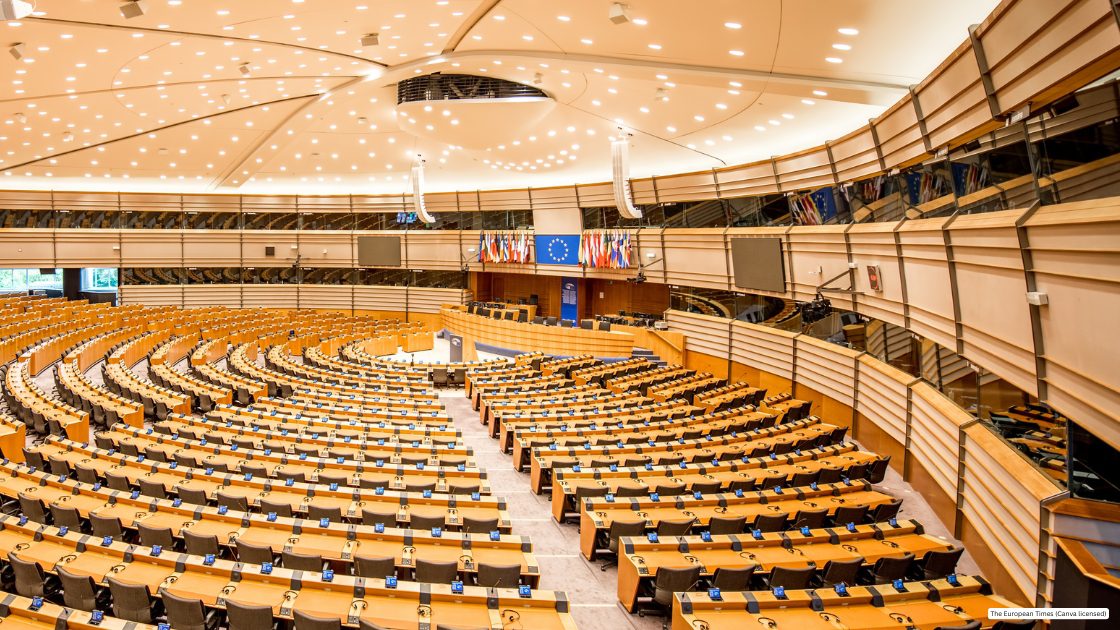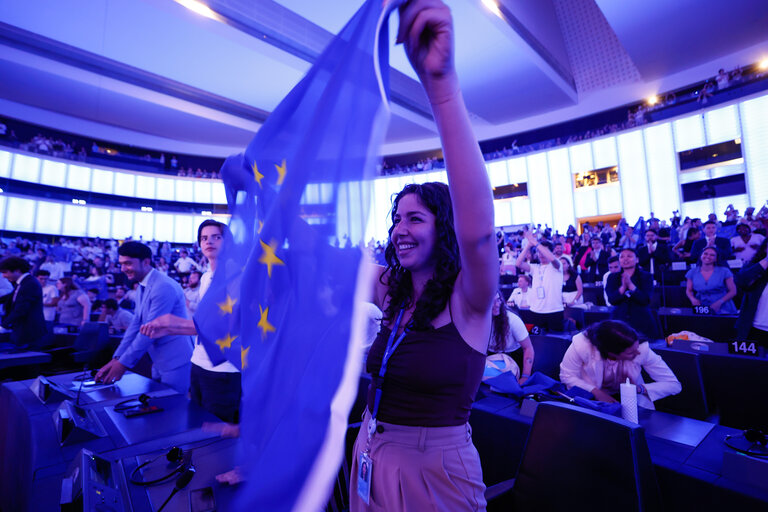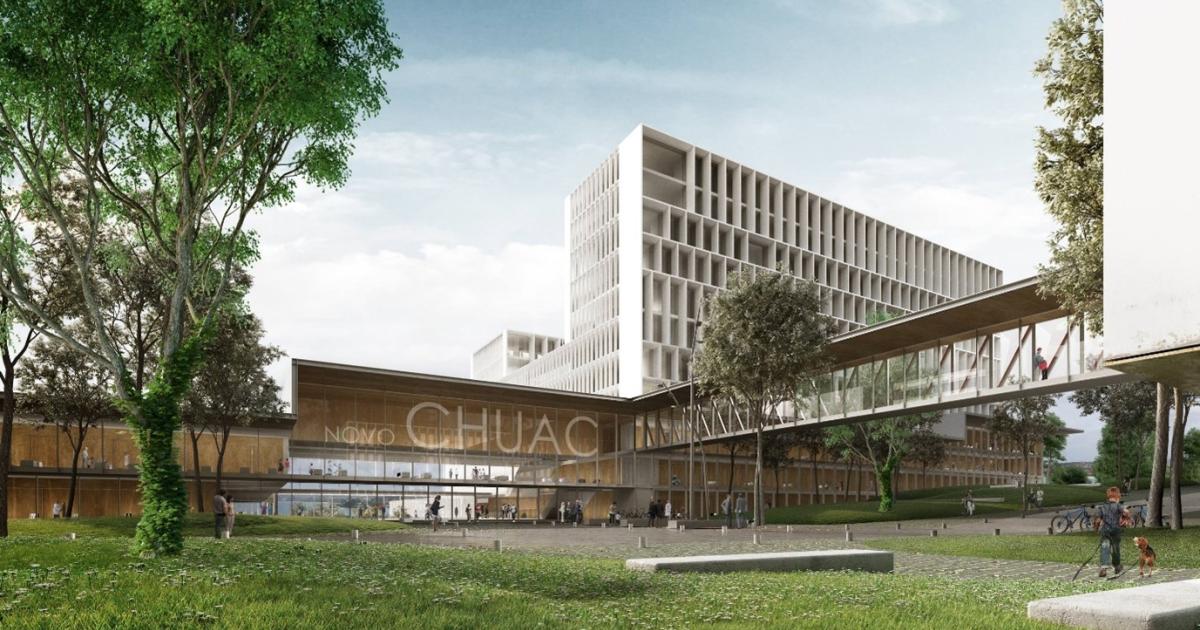Politics
The Role and Importance of the European Parliament in Today’s World
The European Parliament plays a crucial role in shaping the future of Europe and the world. As the only directly elected institution of the European Union, it represents the voice of over 500 million citizens from all 27 member states. With its powers growing steadily over the years, the European Parliament is now one of the most influential bodies in the world, shaping policies and legislation that affect everything from trade and security to the environment and human rights. But what exactly is the role of the European Parliament, and why is it so important? In this article, we’ll explore the key functions of the European Parliament, its impact on global affairs, and why it matters to all of us, regardless of where we live. So, whether you’re a student of politics, a business owner, or simply a concerned citizen, read on to discover the vital role played by the European Parliament in today’s world.
History and evolution of the European Parliament
The European Parliament has its roots in the European Coal and Steel Community, which was established in the aftermath of World War II. The Community was founded with the aim of pooling the coal and steel resources of six European countries: Belgium, France, Germany, Italy, Luxembourg, and the Netherlands. The idea was to create a common market for these resources, which would help to promote economic cooperation and prevent future wars.
The European Parliament was established in 1952 as an advisory body to the High Authority of the European Coal and Steel Community. Initially, it was composed of just 78 members, who were appointed by the national parliaments of the six member states. However, over the years, the Parliament’s powers and responsibilities have steadily grown. In 1979, the Parliament was directly elected for the first time, with citizens of the member states casting their votes for the candidates of their choice. Today, the European Parliament has 705 members, who are elected every five years.
The role of the European Parliament in the European Union
The European Parliament is one of the three main institutions of the European Union, alongside the European Commission and the Council of the European Union. Its role is to represent the interests of the citizens of the EU, and to ensure that their voices are heard in the decision-making process.
One of the key functions of the European Parliament is to pass legislation. The Parliament has the power to initiate, amend, and veto legislation, and it plays a crucial role in the EU’s legislative process. In addition to passing laws, the Parliament also has the power to approve the EU’s budget, and to oversee the work of the other EU institutions.
Another important role of the European Parliament is to hold the other EU institutions to account. The Parliament has the power to question the European Commission and the Council of the EU, and to demand answers on a wide range of issues. This helps to ensure transparency and accountability in the EU’s decision-making process.
The importance of the European Parliament in shaping EU policies
The European Parliament has a significant impact on the policies and legislation of the European Union. As the only directly elected institution of the EU, it represents the voice of the people, and its decisions can have a profound impact on the lives of citizens across the continent.
One of the most important areas where the European Parliament has an impact is in the field of trade. The Parliament has the power to approve or reject international trade agreements, and it plays a crucial role in ensuring that these agreements are fair and transparent. In recent years, the Parliament has been particularly active in this area, rejecting the controversial ACTA agreement in 2012, and demanding greater transparency in negotiations for the TTIP agreement with the United States.
The European Parliament also plays an important role in shaping EU policy on issues such as the environment, human rights, and social justice. Through its legislative powers, the Parliament can help to ensure that these issues are given the attention they deserve, and that EU policies are aligned with the values and priorities of its citizens.
The European Parliament’s legislative process
The legislative process of the European Parliament is complex, but it is designed to ensure that all voices are heard and that decisions are made in a transparent and democratic manner.
The process begins with a proposal from the European Commission, which is then reviewed by the relevant parliamentary committee. The committee will then make amendments to the proposal, which are debated and voted on by the full Parliament. If the proposal is approved, it becomes law, and member states are required to implement it.
Throughout the legislative process, the European Parliament is required to consult with a wide range of stakeholders, including NGOs, businesses, and citizens. This helps to ensure that the legislation is informed by a broad range of perspectives and that it reflects the needs and concerns of all those affected by it.
The European Parliament’s role in ensuring transparency and accountability
One of the key roles of the European Parliament is to ensure that the other EU institutions are transparent and accountable in their decision-making. To this end, the Parliament has a number of mechanisms in place to oversee the work of the European Commission and the Council of the EU.
One of the most important of these mechanisms is the power of the Parliament to approve or reject the appointment of the European Commission. Before taking office, the Commission must be approved by the Parliament, which can reject the entire Commission or individual Commissioners if it deems them unsuitable.
In addition to this, the Parliament also has the power to conduct inquiries into the work of the other EU institutions. This can be a powerful tool for holding those institutions to account and ensuring that they are acting in the best interests of the citizens of the EU.
The European Parliament’s impact on individual citizens and member states
The decisions of the European Parliament can have a profound impact on the lives of individual citizens and member states. For example, EU legislation on issues such as consumer protection, environmental standards, and workers’ rights can have a significant impact on the everyday lives of citizens across the EU.
In addition to this, the European Parliament plays an important role in ensuring that member states adhere to EU law and meet their obligations under EU treaties. This helps to ensure that the EU operates as a cohesive and effective entity, with all member states working together towards common goals.
Challenges faced by the European Parliament
Despite its many achievements, the European Parliament faces a number of challenges in the years ahead. One of the biggest challenges is the rise of nationalist and populist movements across Europe, which have been critical of the EU and its institutions.
Another challenge is the ongoing debate over the future of the EU itself. Some have called for greater integration and a more federalist model of governance, while others have advocated for a looser, more intergovernmental approach.
Finally, the European Parliament must also grapple with the challenges posed by a rapidly changing world. Issues such as climate change, technological disruption, and geopolitical instability will require the EU to be agile and responsive in its decision-making.
Future of the European Parliament
Despite these challenges, the European Parliament remains a vital institution (next elections will be in June 2024) in the global political landscape. Its role in shaping the policies and legislation of the EU, and its commitment to transparency and accountability, make it a powerful force for good in the world.
Looking to the future, the European Parliament will need to continue to adapt and evolve in response to the changing needs of its citizens and the world at large. This will require a renewed commitment to democratic values, a willingness to embrace new technologies and ways of working, and a recognition of the importance of international cooperation in tackling the challenges of the 21st century.
Conclusion
The European Parliament is a vital institution that plays a crucial role in shaping the future of Europe and the world. Through its legislative powers, its oversight of the other EU institutions, and its commitment to transparency and accountability, the Parliament helps to ensure that the voices of the citizens of the EU are heard and that their interests are protected. Despite the challenges it faces, the European Parliament remains a beacon of hope and a powerful force for positive change in the world. As citizens of the EU and the wider world, we must all do our part to support and strengthen this vital institution, and to work towards a brighter future for all.
Politics
New plan will help EU countries tackle cyber-attacks better


© FRVS+MPCP 2022. The European Times® News is registered as an EU Trademark. All rights reserved. The European Times® and the logo of The European Times® are EU trademarks registered by FRVS+MPCP.
Members/Partners of

About Us
Popular Category
DISCLAIMER OPINIONS: The opinions of the authors or reproduced in the articles are the ones of those stating them and it is their own responsibility. Should you find any incorrections you can always contact the newsdesk to seek a correction or right of replay.
DISCLAIMER TRANSLATIONS: All articles in this site are published in English. The translated versions are done through an automated process known as neural translations. If in doubt, always refer to the original article. Thank you for understanding.
DISCLAIMER PHOTOS: We mostly used photos images that are readily available online, from free sources, or from the people promoting the news. If by any chance it happens that we have used one of your copyrighted photos, please do not hesitate to contact us and we will take it down without question. We do not make profits as this is a not for profit project to give voice to the voiceless while giving them a platform to be informed also of general news, and it is completely free.
Editor Picks
Politics
EYE2025 (European Youth Event): thousands to celebrate the power of democracy | News

EYE2025 (European Youth Event) will be opened by Parliament Vice-president Sabine Verheyen (EPP, DE) on Friday 13 June at 10:00 in the EYE village. Vice-president Nicolae Ştefănuță (Greens/EFA, RO) will take part in a session dedicated to the next long-term budget, on Saturday at 15:00. The closing session, with Vice-president Pina Picierno (S&D, IT), will take place on Saturday at 16:45.
Over the two days, there will be panel discussions with MEPs and other EU decision-makers, as well as with experts, activists and content creators. Debates between MEPs and the young participants will cover climate justice, skills for the future, the EU’s next long-term budget, and freedom of speech and media, among many other topics.
Commissioner for Intergenerational Fairness, Youth, Culture and Sport Glenn Micallef will lead a Youth Policy Dialogue on Friday at 11:00, and take part in a panel discussion on young people’s mental health that afternoon. Executive Vice-President of the Commission, Henna Virkkunen will join in a conversation on how technology can strengthen democracy, on Friday at 15:00.
Other guest speakers are democracy activist Daria Navalnya, the Kayapo Amazonian tribal leader Chief Tau Metuktire and the Mayor of Strasbourg Jeanne Barseghian.
The programme also includes workshops on a wide range of issues that concern young people, from disinformation to housing and migration. Quizzes, tours, artistic performances, storytelling workshops and concerts are other options among more than 450 activities organised for the sixth edition of EYE.
All sessions in the hemicycle will be streamed live on the EYE2025 Facebook page and via Parliament’s Multimedia Centre. More details about the schedule, speakers and activities are available on the European Youth Event website.
Press briefing
On Friday 13 June at 16:30, there will be a press briefing with Vice-president Verheyen on media freedom in the EU, in the Daphne Caruana Galizia press conference room. You can follow it live here.
Source link
Politics
Galician healthcare system receives nearly €510 million in EU support for its modernisation

The European Commission supports the development of the new A Coruña university hospital complex (CHUAC) in the city of A Coruña, located in the Spanish region of Galicia. The grant of nearly €60 million awarded under the Public Sector Loan Facility (PSLF), as part of the Just Transition Mechanism (JTM), complements a loan of €450 million provided by the European Investment Bank (EIB), and Xunta de Galicia’s own resources, bringing the total investment to €600 million.
This social infrastructure project of regional interest aims to expand and modernise the existing hospital complex in A Coruña. It is one of Xunta de Galicia’s major actions to strengthen its public healthcare system. The new hospital complex will include state-of-the-art infrastructure and facilities to provide comprehensive and high-quality healthcare and medical services for patients.
The resulting modern and sustainable healthcare infrastructure will improve the provision of health services and the quality of life of the citizens of Galicia, which in turn will enhance regional convergence with a significant impact on the local economy and employment.
Thanks to this project, around 564 000 people are expected to benefit from more efficient, accessible and quality health services in A Coruña and the surrounding areas. The project is also expected to create an estimated 6 140 direct and indirect jobs related to health infrastructure, representing approximately 1.3% of the employed population in A Coruña. With its energy efficiency measures, bioclimatic architecture, as well as sustainable and smart resources management, the project can substantially contribute to climate change mitigation.
This investment therefore plays a crucial role in mitigating the long-term socioeconomic consequences of the coal-fired plants closures in the region, while promoting a sustainable and an inclusive recovery for Galicia in the context of the region’s ageing demographic and green transitions.
Emma Toledano Laredo, Director at the European Commission (DG REGIO), said:
The European Commission, together with CINEA and the EIB, is very proud to bring the new A Coruña university hospital complex to life thanks to the Public Sector Loan Facility. This green, innovative and people-first project will enhance the provision of healthcare to Galicians, while bringing jobs to the region. This is yet another example of how a just and green transition can bring improvement in all sectors of a regional economy and its people.
Paloma Aba Garrote, Director of CINEA, added:
The new A Coruña university hospital complex is an excellent example of how the Public Sector Loan Facility can support European regions in their transition towards climate neutrality and improve people’s lives. Together with our partners, we are proud to invest in a sustainable and modern healthcare infrastructure, which will provide high-quality and accessible services for Galicians while fostering social cohesion, regional convergence and sustainability.
A spokesperson for the Xunta de Galicia regional government stated:
This project aiming to modernise and expand the A Coruña university hospital complex is a fundamental investment to develop the Galician healthcare infrastructure. Galicia is the first Spanish region to receive support from the Public Sector Loan Facility. Moreover, the new CHUAC project has been awarded the biggest PSLF grant so far, amounting to €59.3 million.
About PSLF
The Public Sector Loan Facility (PSLF) is the third pillar of the Just Transition Mechanism (JTM) – a key tool of the European Green Deal Investment Plan to make sure that no one and no region is left behind in the transition to a climate-neutral economy.
The PSLF combines loans from the European Investment Bank (up to around €6-8 billion) with grants from the European Commission (up to €1.3 billion). The combined support is designed to mobilise additional investments for public sector entities in the regions most affected by the green transition as identified in the Territorial Just Transition Plans, to meet their development needs as they move towards a climate-neutral economy. Each Member State creates these plans to identify the challenges faced by just transition regions, along with their development needs and targets for 2030.
The combination of the European Investment Bank loan and the EU grant will help fund projects that do not generate enough revenues to cover their costs.
PSLF is managed by DG REGIO and implemented by CINEA.
About DG REGIO
The Directorate-General for Regional and Urban Policy (DG REGIO) is the department of the European Commission responsible for EU policies on regions and cities. It develops and carries out the Commission’s policies on regional and urban policy. It assists the economic and social development of the developed and less developed regions across the European Union.
About CINEA
The European Climate, Infrastructure and Environment Executive Agency (CINEA) is an Executive Agency established by the European Commission to implement parts of EU funding programmes for transport, energy, climate action, environment and maritime fisheries and aquaculture. CINEA aims to assist its beneficiaries, establish strong partnerships, deliver high-quality programme and project management, foster effective knowledge sharing and create synergies between programmes – to support a sustainable, connected, and decarbonised Europe.
About the EIB
The European Investment Bank (EIB), whose shareholders are the 27 Member States of the European Union, is the EU’s long-term financing institution. The EIB provides loans to the public and private sectors to support high-quality investments contributing to the achievement of the EU headline targets.
Visit the PSLF webpage on CINEA website to find out more about the Facility and the projects it funds.
-
EU & the World5 days ago
Aurora Borealis Forecast: Where & When to See the Northern Lights Tonight
-

 Sports6 days ago
Sports6 days agoChampions League Final 2024-2025: PSG-Inter, official lineups
-

 EU & the World6 days ago
EU & the World6 days agoRihanna’s Parents: About Her Late Dad Ronald Fenty & Mom Monica Braithwaite
-

 Sports5 days ago
Sports5 days agoOfficial: Damien Comolli new general manager of Juventus.
-

 EU & the World6 days ago
EU & the World6 days agoLoretta Swit’s Net Worth: How Much Money the ‘M*A*S*H’ Alum Had
-

 EU & the World6 days ago
EU & the World6 days ago‘King of the Hill’ Revival: Upcoming Hulu Sitcom’s Release Date & More
-

 Sports6 days ago
Sports6 days ago“Pecco Bagnaia is a'shadow”: the'former driver celebrates Marc Marquez
-

 EU & the World6 days ago
EU & the World6 days agoTaylor Swift’s Net Worth: How Much Money She Has in 2025









